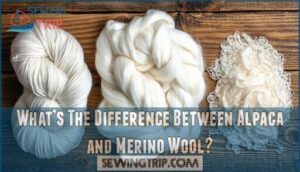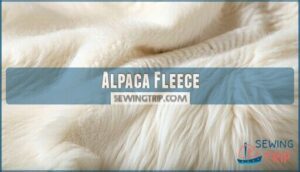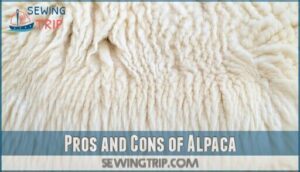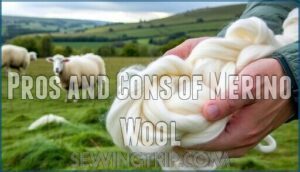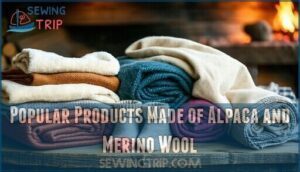This site is supported by our readers. We may earn a commission, at no cost to you, if you purchase through links.
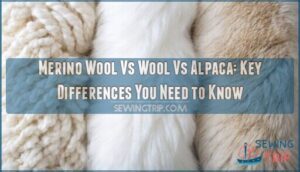 When comparing merino wool vs wool vs alpaca, it’s all about the details.
When comparing merino wool vs wool vs alpaca, it’s all about the details.
Merino wool, from merino sheep, is soft, lightweight, and great at regulating temperature—perfect for outdoor adventures. Regular wool (from various sheep) can be coarser but still provides insulation.
Alpaca, sourced from—you guessed it—alpacas, is like nature’s luxury blanket: warmer than wool, softer, and hypoallergenic. It’s also moisture-wicking but less elastic than merino.
If warmth and plushness matter, go with alpaca. For versatility and performance, merino wins.
Traditional wool? It’s a workhorse for sturdy, everyday layers. Choosing depends on your needs—your decision might surprise you!
Table Of Contents
Key Takeaways
- You’ll find alpaca wool warmer, softer, and hypoallergenic, making it great for sensitive skin and extreme cold.
- Merino wool is prized for its softness, breathability, and elasticity, excelling in activewear and temperature regulation.
- Regular wool is durable and heavier, suiting robust, everyday layers but lacks the finesse of merino or alpaca farming.
- Alpaca farming is more eco-friendly and sustainable, while merino wool offers better moisture-wicking and shape retention.
Origins of Alpaca and Merino Wool
Alpacas, domesticated by the Incas over 6,000 years ago, give us alpaca wool, praised for its softness and warmth.
Praised for unmatched softness and warmth, alpaca wool has been cherished since the Incas domesticated alpacas over 6,000 years ago.
Meanwhile, merino wool hails from Merino sheep, a breed with Spanish origins, known for its fine, luxurious fleece.
Peru leads in alpaca fiber export, while Australia and New Zealand dominate Merino wool production.
Unlike regular wool, both fibers are breed-specific and environmentally friendly.
Alpaca wool is hypoallergenic, thanks to low lanolin, while Merino’s fibers, although rich in wool history, contain some lanolin.
What is Merino Wool?
Merino wool, sourced from a special breed of sheep, is prized for its soft texture, breathability, and versatility across wool types.
Prized for its soft texture and breathability, Merino wool offers unmatched comfort and versatile warmth for every adventure.
With a fine fiber diameter, it’s ideal for premium clothing like base layers. Merino grades range from regular to ultra-soft superfine, making it perfect for sensitive skin.
Known for moisture-wicking and insulating properties, it excels in outdoor and activewear uses. Ethical sourcing practices also make it eco-friendly.
If you’re after softness and performance, merino benefits are hard to beat!
What is Alpaca Wool?
If you’re curious about alpaca wool, it’s more than soft—it’s extraordinary.
Alpacas, native to South America, deliver hypoallergenic fibers ideal for sensitive skin.
Unlike itchy wool types, alpaca fiber comes from two main breeds: Huacaya, known for its fluffy texture, and Suri, prized for its silky sheen.
Alpaca wool’s fiber grades range from ultra-fine to coarser varieties, but even the coarsest is smoother than many wool types.
Its natural wool colors span over 20 shades, complementing eco-conscious fashion trends.
Thanks to superior warmth, water resistance, and odor control, alpaca uses extend to cozy socks, scarves, and outdoor gear.
With ethical sourcing gaining traction, alpaca wool lets you wear comfort while supporting sustainable practices.
What’s The Difference Between Alpaca and Merino Wool?
When comparing alpaca wool to merino wool, you’ll find key differences that matter depending on your needs.
Alpaca wool, softer thanks to its smoother fiber diameter, is hypoallergenic since it’s free from lanolin. Merino wool, while softer than regular wool, contains lanolin, which might irritate sensitive skin.
Here’s a quick rundown:
- Fiber Diameter: Alpaca ranges from 15-36 microns, while merino is finer at 11.5-22 microns.
- Water Absorption: Alpaca absorbs less (10-11%), drying faster; merino handles 30% of its weight but dries slower.
- Natural Colors: Alpaca offers up to 22 shades; merino is usually white.
- Ethical Sourcing: Both are renewable, but alpaca farming uses fewer resources.
- Wool Properties: Alpaca’s hollow fibers make it warmer; merino excels at shape retention.
Alpaca Fleece
Alpaca fleece stands out for its soft texture, impressive warmth, and natural hypoallergenic properties, making it a favorite for sensitive skin.
Its hollow fibers provide excellent insulation and moisture resistance, ideal for keeping you cozy without added bulk, due to their natural properties.
Texture
How does texture change your experience with fabric?
Fiber smoothness and scale structure set merino wool and alpaca wool apart. Merino’s finer fibers can feel soft, yet the scale structure may contribute to itchiness for some.
Alpaca, with its smoother, silk-like texture and fewer scales, offers a softer, non-itchy fabric hand—perfect for sensitive skin.
Here’s a snapshot:
| Feature | Merino Wool | Alpaca Wool |
|---|---|---|
| Softness | Soft | Exceptionally soft |
| Scales | More pronounced | Smoother, less pronounced |
| Itchiness | Potential irritation | Rarely itchy |
| Feel | Lightweight | Silky, luxurious |
| Comfort | Reliable for most users | Hypoallergenic |
Choose sensory perception you’ll love!
Warmth
In terms of warmth, alpaca wool truly shines. Its hollow core structure makes it a superior insulator, trapping air more effectively than merino wool, and offering higher insulation value per gram.
You’ll notice this warmth factor most in frigid weather, as alpaca fleece retains body heat exceptionally well without feeling bulky. While merino uses its fiber crimps to hold heat, alpaca’s semi-hollow fibers give it the edge in extreme cold.
- Hollow core fibers provide unmatched thermal insulation.
- Lightweight but warmer than merino wool in cold weather.
- Effective temperature regulation across varying conditions.
- Alpaca efficiently resists moisture buildup, staying comfortable.
- Ideal for outdoor activities requiring minimal layer weight.
Stay cozy without the weight!
Durability
In terms of durability, alpaca wool and merino wool stand out in the wool comparison.
Alpaca wool boasts remarkable fiber strength and abrasion resistance, ensuring fewer pilling issues.
Merino wool, known for its elastic structure, retains shape over time, enhancing garment lifespan.
Proper care is vital; gentle cleaning preserves both fibers.
If you’re rough on clothing or need outdoor resilience, alpaca wins for toughness.
However, for daily wear, merino wool’s balance of softness and durability makes it a reliable choice.
Moisture Wicking
Merino wool and alpaca wool excel in moisture wicking but shine differently.
Merino wool stands out for its moisture absorption, pulling up to 30% of its dry weight, keeping you dry even during physical activity.
Meanwhile, alpaca wool’s hydrophobicity limits absorption to around 10-11%, making it quicker to dry.
With alpaca’s hollow fibers boosting Breathability Factors and Climate Performance, it offers warmth without sacrificing dryness.
While merino wool resists odor better, alpaca fleece is a durable, lightweight contender for unpredictable conditions.
Weight
In terms of weight, alpaca wool outshines merino wool and traditional wool for lightweight warmth.
Thanks to its semi-hollow fibers, alpaca provides superior insulation while remaining substantially lighter. This makes it perfect for layering options or activities where packability matters. Plus, its unique fiber density balances warmth and breathability effectively.
Merino wool, while heavier, excels in moisture management and versatility across seasons.
Wool, on the other hand, has a higher fabric weight and is better suited for outer layers than active pursuits.
- Alpaca wool: Lightweight, ideal for activewear.
- Merino wool: Heavier, great for year-round use.
- Wool: Best for heavy-duty warmth.
Pros and Cons of Alpaca
Alpaca wool stands out with its softness, warmth, and impressive durability, making it a luxurious yet practical choice for your wardrobe.
It’s hypoallergenic, thanks to its lack of lanolin, so if regular wool leaves you itchy, alpaca might feel like a dream. Alpaca fibers are naturally lightweight but insulate like a pro, keeping you cozy in the chilliest weather.
Plus, their hollow structure wicks moisture and repels water, making alpaca wool a reliable pick for outdoor adventures, whether you’re hiking or caught in unexpected rain.
Sustainability is another win—alpacas are gentle grazers, requiring fewer resources than sheep, and their wool is biodegradable. However, those advantages come at a cost.
Alpaca wool tends to be pricey, and you’ll need skilled shearers for annual maintenance. Is alpaca as good as merino? It depends on your priorities—but it’s a top contender.
Pros and Cons of Merino Wool
When weighing your options between alpaca and merino wool, it’s smart to know what merino brings to the table.
This wool is prized for its softness—each fiber is finer than a human hair—and high-quality Moisture Management.
It keeps you warm, wicks sweat, and resists odors, making it perfect for outdoor adventures.
Plus, its hypoallergenic nature is a win for sensitive skin.
That said, merino wool has its quirks.
Watch out for these:
- Durability: It’s not as tough as alpaca wool, so proper care is a must.
- Care Requirements: Washing improperly might ruin the fibers over time.
- Cost Analysis: It’s on the pricier side, thanks to its premium quality.
Still, when comfort and versatility matter, merino wool shines.
Popular Products Made of Alpaca and Merino Wool
You’ve probably worn wool products before, but alpaca and merino wool take things to the next level with their unique benefits.
From cozy alpaca socks to versatile merino wool beanies, these fibers offer comfort, durability, and performance for everyday and outdoor use.
Alpaca Socks
Say goodbye to chilly feet with alpaca socks—they’re warm, soft, and perfect for outdoor adventures.
Made from huacaya alpaca wool, these socks combine luxurious comfort with practical benefits.
Their hollow fibers offer high-quality insulation, while the hypoallergenic nature means no itchiness.
Alpaca sock durability guarantees they’re tough enough for hiking yet lightweight for easy packing.
With natural moisture-wicking properties, your feet stay dry and cozy.
For a variety of options, consider exploring alpaca hiking socks.
Available in various alpaca sock styles and hues, they’re also eco-friendly and machine washable—perfect for sustainability-conscious adventurers!
Merino Wool Beanie
In terms of beanie warmth and style, a Merino wool beanie is hard to beat.
Thanks to its fine fibers, Merino wool offers unmatched softness, making beanie itchiness a non-issue.
It’s naturally stretchy and breathable, ensuring comfort whether you’re tackling a snowy hike or enjoying a crisp morning coffee.
With impressive durability, this wool beanie resists wear and tear, maintaining its shape over time.
Plus, it’s odor-resistant, so you can stay fresh during extended use.
Consider exploring a Merino wool beanie for superior comfort.
Caring for it’s a breeze—gentle hand-washes will keep it looking sharp.
Stylish yet functional, a Merino wool beanie is your go-to accessory for reliable warmth and comfort.
Frequently Asked Questions (FAQs)
Is alpaca or merino wool better?
Choosing between alpaca and merino wool is like picking apples or oranges—both shine differently.
Alpaca offers superior warmth and sustainability, while merino excels in moisture-wicking and elasticity.
Your choice depends on climate, activity, and sensitivity!
Which is better wool or merino wool?
Merino wool’s finer fibers make it softer, less itchy, and lighter than regular wool, while maintaining better moisture-wicking capabilities.
Regular wool is heavier, warmer, and often itchier, suiting outer layers more than activewear or base layers, which makes Merino wool a better choice for activewear.
Which type of wool is the warmest?
When winter bites and warmth feels like a distant dream, alpaca wool takes the crown.
Its hollow fibers trap heat more effectively than Merino or regular wool, making it perfect for extreme cold.
What are the disadvantages of alpaca wool?
Alpaca wool can be pricey, stain-resistant but absorbs odors, and it pills under heavy use.
It’s less stretchy than merino, making garments lose shape quicker.
Thicker fibers may feel less soft, especially in coarser grades.
Is alpaca wool better than Merino wool?
You get what you pay for, but with wool, it depends.
Alpaca’s warmer, hypoallergenic, and water-repellent.
Merino wins in breathability and shape retention.
The best choice depends on your needs for warmth or versatility.
Is alpaca wool hypoallergenic?
Yes, alpaca wool is hypoallergenic, thanks to its lack of lanolin, a natural oil that can irritate sensitive skin.
If you’ve had issues with regular wool, alpaca might be your itch-free solution!
Does Merino wool provide good insulation?
Merino wool gives great insulation by trapping heat in its microscopic air pockets.
It keeps you cozy in chilly weather while staying breathable.
Its versatility makes it perfect for layering, whether hiking or lounging at home.
Can Merino wool be blended with other fibers?
Think of Merino wool as a team player—it blends beautifully with fibers like nylon, polyester, or silk.
These combos enhance durability, elasticity, or softness, making your gear more versatile without losing Merino’s signature breathability and coziness.
Is alpaca wool fire-retardant?
Alpaca wool isn’t naturally fire-retardant, but its fire resistance is higher compared to many synthetic fabrics.
It chars instead of melting or igniting easily, making it safer around sparks or open flames.
How does sustainability differ between alpaca and merino wool?
Sustainability-wise, alpaca wool is like nature’s genius—it requires less water, avoids chemical-heavy processes, and grazes lightly.
Merino wool’s farming, despite certifications, demands more resources, including superwashing, which impacts the environment.
Alpaca wins eco-friendly points, as it stands out for its sustainable farming practices compared to other types of wool.
Conclusion
Choosing between merino wool, regular wool, and alpaca depends on your priorities.
Merino wool’s elasticity and versatility make it ideal for active lifestyles, while traditional wool offers reliability for workhorse layers.
Alpaca, however, shines in warmth and plush softness, doubling as a hypoallergenic option.
Each has unique strengths, so consider the balance of comfort, durability, and performance.
When debating merino wool vs wool vs alpaca difference, match the material to your needs, and you’ll pick the perfect fit.

